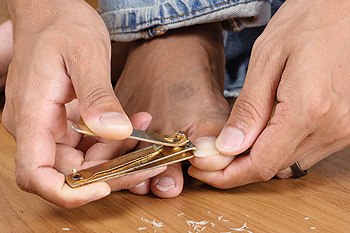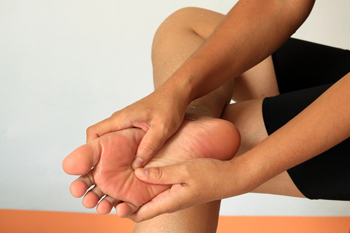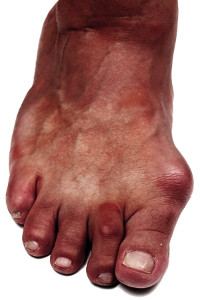Connect With Us
Blog
Items filtered by date: May 2019
Daily Methods for Healthy Foot Care
 The feet are considered to be the foundation of the body. It is important to implement daily steps to ensure the feet stay healthy. Uncomfortable foot conditions which may include bunions, ingrown toenails and general foot pain may be avoided when properly fitting shoes are worn. The tendons and ligaments in the feet can be stretched while performing a daily exercise routine, which is important in maintaining strong foot muscles. Additionally, your feet may begin to feel better when they are washed at the end of every day, followed by utilizing a good moisturizer. This may help to prevent cracked heels. If you would like additional information about how to care for your feet daily, it is suggested to consult with a podiatrist.
The feet are considered to be the foundation of the body. It is important to implement daily steps to ensure the feet stay healthy. Uncomfortable foot conditions which may include bunions, ingrown toenails and general foot pain may be avoided when properly fitting shoes are worn. The tendons and ligaments in the feet can be stretched while performing a daily exercise routine, which is important in maintaining strong foot muscles. Additionally, your feet may begin to feel better when they are washed at the end of every day, followed by utilizing a good moisturizer. This may help to prevent cracked heels. If you would like additional information about how to care for your feet daily, it is suggested to consult with a podiatrist.
Everyday foot care is very important to prevent infection and other foot ailments. If you need your feet checked, contact Tanisha Richmond, DPM from Richmond Foot & Ankle, LLC. Our doctor can provide the care you need to keep you pain-free and on your feet.
Everyday Foot Care
Often, people take care of their bodies, face and hair more so than they do for their feet. But the feet are a very important aspect of our bodies, and one that we should pay more attention to. Without our feet, we would not be able to perform most daily tasks.
It is best to check your feet regularly to make sure there are no new bruises or cuts that you may not have noticed before. For dry feet, moisturizer can easily be a remedy and can be applied as often as necessary to the affected areas. Wearing shoes that fit well can also help you maintain good foot health, as well as making it easier to walk and do daily activities without the stress or pain of ill-fitting shoes, high heels, or even flip flops. Wearing clean socks with closed shoes is important to ensure that sweat and bacteria do not accumulate within the shoe. Clean socks help to prevent Athlete’s foot, fungi problems, bad odors, and can absorb sweat.
If you have any questions please feel free to contact our office located in Dayton, OH . We offer the newest diagnostic and treatment technologies for all your foot and ankle needs.
Possible Causes of Bunions
A bony protrusion on the side of the big toe is referred to as a bunion. It occurs as a result of a misaligned joint in the big toe and will cause the toe to point out. It typically develops gradually and can be caused by wearing shoes that do not fit properly. These types of shoes include high heels, which may provide inadequate room for the toes to move freely in. Additional reasons why bunions develop include medical conditions such as arthritis, flat feet, or bone deformities. Symptoms of this condition consist of swelling, tenderness, and the affected area may feel stiff. Mild relief may be found while wearing wider shoes, and this may help to reduce friction between the bunion and the shoe. If you have a bunion, please consult with a podiatrist who can properly diagnosis and treat this condition.
If you are suffering from bunions, contact Tanisha Richmond, DPM of Richmond Foot & Ankle, LLC. Our doctor can provide the care you need to keep you pain-free and on your feet.
What Is a Bunion?
A bunion is formed of swollen tissue or an enlargement of boney growth, usually located at the base joint of the toe that connects to the foot. The swelling occurs due to the bones in the big toe shifting inward, which impacts the other toes of the foot. This causes the area around the base of the big toe to become inflamed and painful.
Why Do Bunions Form?
Genetics – Susceptibility to bunions are often hereditary
Stress on the feet – Poorly fitted and uncomfortable footwear that places stress on feet, such as heels, can worsen existing bunions
How Are Bunions Diagnosed?
Doctors often perform two tests – blood tests and x-rays – when trying to diagnose bunions, especially in the early stages of development. Blood tests help determine if the foot pain is being caused by something else, such as arthritis, while x-rays provide a clear picture of your bone structure to your doctor.
How Are Bunions Treated?
- Refrain from wearing heels or similar shoes that cause discomfort
- Select wider shoes that can provide more comfort and reduce pain
- Anti-inflammatory and pain management drugs
- Orthotics or foot inserts
- Surgery
If you have any questions, please feel free to contact our office located in Dayton, OH . We offer the newest diagnostic and treatment technologies for all your foot care needs.
Possible Causes of Foot Pain
 Many people experience several forms of foot pain. This may be a result of spending the majority of the day walking or standing. A common foot ailment is known as athlete’s foot, and is considered to be a fungal infection of the skin. The symptoms that are associated with this condition consist of itching or blisters between the toes, and the soles of the feet may peel and appear red. Wearing shoes that fit poorly is a cause of ingrown toenails, and this condition can produce considerable pain and discomfort. In severe cases, there can be drainage from the toenail which can indicate an existing infection. A bony protrusion on the side of the big toe is indicative of a bunion. A common cause of this is wearing shoes that are too narrow. Additionally, if there is a family history of bunions, the chances of developing this ailment may increase. If you are having any type of foot pain, it is suggested that you schedule a consultation with a podiatrist who can properly treat any foot condition.
Many people experience several forms of foot pain. This may be a result of spending the majority of the day walking or standing. A common foot ailment is known as athlete’s foot, and is considered to be a fungal infection of the skin. The symptoms that are associated with this condition consist of itching or blisters between the toes, and the soles of the feet may peel and appear red. Wearing shoes that fit poorly is a cause of ingrown toenails, and this condition can produce considerable pain and discomfort. In severe cases, there can be drainage from the toenail which can indicate an existing infection. A bony protrusion on the side of the big toe is indicative of a bunion. A common cause of this is wearing shoes that are too narrow. Additionally, if there is a family history of bunions, the chances of developing this ailment may increase. If you are having any type of foot pain, it is suggested that you schedule a consultation with a podiatrist who can properly treat any foot condition.
Foot Pain
Foot pain can be extremely painful and debilitating. If you have a foot pain, consult with Tanisha Richmond, DPM from Richmond Foot & Ankle, LLC. Our doctor will assess your condition and provide you with quality foot and ankle treatment.
Causes
Foot pain is a very broad condition that could be caused by one or more ailments. The most common include:
- Bunions
- Hammertoes
- Plantar Fasciitis
- Bone Spurs
- Corns
- Tarsal Tunnel Syndrome
- Ingrown Toenails
- Arthritis (such as Gout, Rheumatoid, and Osteoarthritis)
- Flat Feet
- Injury (from stress fractures, broken toe, foot, ankle, Achilles tendon ruptures, and sprains)
- And more
Diagnosis
To figure out the cause of foot pain, podiatrists utilize several different methods. This can range from simple visual inspections and sensation tests to X-rays and MRI scans. Prior medical history, family medical history, and any recent physical traumatic events will all be taken into consideration for a proper diagnosis.
Treatment
Treatment depends upon the cause of the foot pain. Whether it is resting, staying off the foot, or having surgery; podiatrists have a number of treatment options available for foot pain.
If you have any questions, please feel free to contact our office located in Dayton, OH . We offer the newest diagnostic and treatment technologies for all your foot care needs.
Painful Plantar Warts
 The location of a plantar wart is on the sole of the foot. It often develops in the heel area of the foot and grows into the skin. This is a result of consistent weight that is put on the heel while walking or standing. The fungus that causes this type of wart is known as the human papillomavirus (HPV) and is considered to be contagious. Some of the symptoms that are associated with this condition include a hard and callused area on the heel of the foot, and pain while bearing weight on the foot. Additionally, clotted blood vessels will often appear in the center, which look like tiny black dots. This type of fungus thrives in warm and moist places, which include public swimming pools and surrounding areas, and can easily spread by sharing socks or towels. If you would like information about proper treatment options for a plantar’s wart, please counsel with a podiatrist.
The location of a plantar wart is on the sole of the foot. It often develops in the heel area of the foot and grows into the skin. This is a result of consistent weight that is put on the heel while walking or standing. The fungus that causes this type of wart is known as the human papillomavirus (HPV) and is considered to be contagious. Some of the symptoms that are associated with this condition include a hard and callused area on the heel of the foot, and pain while bearing weight on the foot. Additionally, clotted blood vessels will often appear in the center, which look like tiny black dots. This type of fungus thrives in warm and moist places, which include public swimming pools and surrounding areas, and can easily spread by sharing socks or towels. If you would like information about proper treatment options for a plantar’s wart, please counsel with a podiatrist.
Plantar warts can be very uncomfortable. If you need your feet checked, contact Tanisha Richmond, DPM from Richmond Foot & Ankle, LLC. Our doctor will assist you with all of your foot and ankle needs.
About Plantar Warts
Plantar warts are the result of HPV, or human papillomavirus, getting into open wounds on the feet. They are mostly found on the heels or balls of the feet.
While plantar warts are generally harmless, those experiencing excessive pain or those suffering from diabetes or a compromised immune system require immediate medical care. Plantar warts are easily diagnosed, usually through scraping off a bit of rough skin or by getting a biopsy.
Symptoms
- Lesions on the bottom of your feet, usually rough and grainy
- Hard or thick callused spots
- Wart seeds, which are small clotted blood vessels that look like little black spots
- Pain, discomfort, or tenderness of your feet when walking or standing
Treatment
- Freezing
- Electric tool removal
- Laser Treatment
- Topical Creams (prescription only)
- Over-the-counter medications
To help prevent developing plantar warts, avoid walking barefoot over abrasive surfaces that can cause cuts or wounds for HPV to get into. Avoiding direct contact with other warts, as well as not picking or rubbing existing warts, can help prevent the further spread of plantar warts. However, if you think you have developed plantar warts, speak to your podiatrist. He or she can diagnose the warts on your feet and recommend the appropriate treatment options.
If you have any questions please feel free to contact our office located in Dayton, OH . We offer the newest diagnostic and treatment technologies for all your foot and ankle needs.
Are You Suffering From Ingrown Toenails?
Blog Archives
- April 2024
- March 2024
- February 2024
- January 2024
- December 2023
- November 2023
- October 2023
- September 2023
- August 2023
- July 2023
- June 2023
- May 2023
- April 2023
- March 2023
- February 2023
- January 2023
- December 2022
- November 2022
- October 2022
- September 2022
- August 2022
- July 2022
- June 2022
- May 2022
- April 2022
- March 2022
- February 2022
- January 2022
- December 2021
- November 2021
- October 2021
- September 2021
- August 2021
- July 2021
- June 2021
- May 2021
- April 2021
- March 2021
- February 2021
- January 2021
- December 2020
- November 2020
- October 2020
- September 2020
- August 2020
- July 2020
- June 2020
- May 2020
- April 2020
- March 2020
- February 2020
- January 2020
- December 2019
- November 2019
- October 2019
- September 2019
- August 2019
- July 2019
- June 2019
- May 2019
- April 2019
- March 2019
- February 2019
- January 2019
- December 2018
- November 2018

